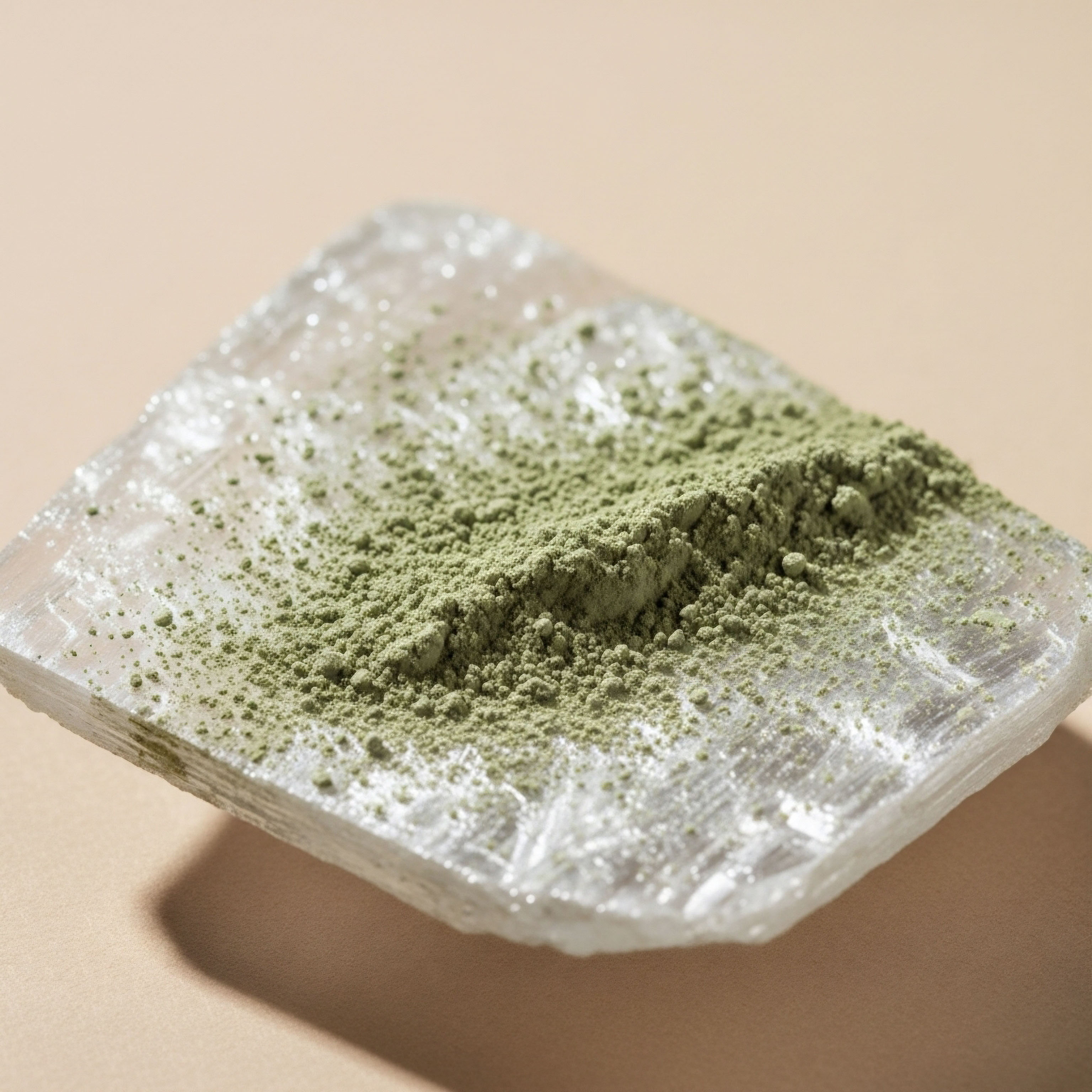

Fundamentals
Many individuals navigating the complexities of their health journey often encounter moments of profound frustration, particularly when experiencing subtle yet persistent shifts in their mental acuity. Perhaps you have noticed a certain fogginess, a slight hesitation in recall, or a diminished sharpness that was once a given.
This experience can be disorienting, especially when it coincides with protocols aimed at improving other aspects of well-being, such as addressing hair thinning or prostate health. Understanding these shifts requires a deeper look into the body’s intricate internal messaging system, the endocrine network, and how seemingly isolated interventions can ripple across various physiological domains.
The conversation around dihydrotestosterone (DHT) blockers frequently centers on their well-documented effects on androgen-sensitive tissues, such as the scalp and prostate gland. These agents, like finasteride or dutasteride, operate by inhibiting the enzyme 5-alpha reductase, which is responsible for converting testosterone into its more potent metabolite, DHT.
While effective in their primary applications, the systemic reduction of DHT can introduce unforeseen consequences, particularly within the central nervous system. The brain, a highly metabolically active organ, relies on a delicate balance of neurosteroids and neurotransmitters for optimal function. Disrupting this balance, even with a targeted intervention, can lead to a spectrum of cognitive and mood-related alterations.
The human body operates as a symphony of interconnected systems, where each component influences the others. Hormones, acting as chemical messengers, orchestrate a vast array of physiological processes, including those governing mood, memory, and overall cognitive processing. When the levels of key hormones, or their metabolites, are altered, the brain’s ability to perform its complex tasks can be compromised.
This is not a mere side effect; it represents a direct alteration of neurobiological pathways that depend on specific hormonal signals for their proper operation.
Cognitive shifts experienced during DHT blocker use reflect the brain’s reliance on a precise hormonal environment for optimal mental function.
Testosterone, often considered primarily a male hormone, plays a significant role in both male and female physiology, extending its influence far beyond reproductive functions. Within the brain, testosterone and its derivatives act as neurosteroids, directly influencing neuronal excitability, synaptic plasticity, and the production of neurotransmitters.
DHT, as a potent androgen, also possesses its own distinct neurobiological actions, interacting with androgen receptors located in various brain regions critical for cognition, including the hippocampus and prefrontal cortex. Reducing DHT levels can therefore alter these direct neurosteroid actions, potentially impacting memory consolidation, spatial reasoning, and executive function.

The Brain’s Hormonal Landscape
The brain is not merely a passive recipient of hormonal signals; it actively synthesizes its own neurosteroids from cholesterol, including forms of testosterone and DHT. These locally produced hormones act in a paracrine or autocrine fashion, meaning they influence nearby cells or the cells that produced them.
This localized hormonal activity is distinct from systemic circulation and underscores the brain’s unique dependence on these compounds for its intrinsic operations. When a systemic DHT blocker is introduced, it can interfere with both circulating and locally synthesized DHT, creating a more widespread impact on brain chemistry than initially considered.
Understanding the potential for cognitive alterations requires acknowledging the brain’s reliance on these specific hormonal signals. Individuals experiencing changes in mental clarity, memory, or emotional regulation while on DHT blockers are not imagining these symptoms. Their experiences reflect a genuine physiological response to altered neurosteroid profiles. The goal then becomes not to dismiss these concerns, but to understand the underlying biological mechanisms and explore strategies to restore optimal brain function.

Why Does DHT Influence Cognition?
DHT’s influence on cognitive processes stems from its direct interaction with androgen receptors in the brain. These receptors are distributed in areas vital for learning and memory. When DHT binds to these receptors, it can modulate gene expression, influence neuronal growth, and affect the synthesis and release of neurotransmitters. A reduction in DHT, therefore, can lead to a decrease in these neurotrophic and neuromodulatory effects, potentially manifesting as cognitive dullness or difficulty with certain mental tasks.
Moreover, the balance between testosterone, DHT, and estrogen within the brain is critical. While DHT blockers specifically target the conversion of testosterone to DHT, they can also indirectly affect the overall androgen-estrogen ratio, which holds significance for brain health. Estrogen, derived from testosterone via the aromatase enzyme, also plays a neuroprotective role and supports cognitive function. A complex interplay exists, and altering one component can cascade through the entire system, necessitating a comprehensive approach to restoration.


Intermediate
Addressing the cognitive shifts associated with DHT blocker use requires a thoughtful, individualized approach to hormonal optimization. This involves not simply replacing what is lost, but recalibrating the entire endocrine system to support optimal brain function. The protocols employed aim to restore a harmonious balance of neurosteroids and neurotransmitters, recognizing that the brain’s health is inextricably linked to systemic hormonal equilibrium.
One primary strategy involves the careful application of Testosterone Replacement Therapy (TRT). For men experiencing symptoms of low testosterone, which can be exacerbated by DHT blockers, weekly intramuscular injections of Testosterone Cypionate are a standard protocol. This exogenous testosterone helps to replenish circulating levels, providing the substrate for both androgenic and estrogenic pathways that are vital for cognitive health.
The precise dosage, often around 200mg/ml, is tailored to individual needs, aiming for physiological levels that support overall well-being without inducing supraphysiological states.
To maintain the body’s intrinsic hormonal rhythm and preserve fertility in men on TRT, adjunctive therapies are frequently incorporated. Gonadorelin, administered via subcutaneous injections typically twice weekly, stimulates the pituitary gland to release luteinizing hormone (LH) and follicle-stimulating hormone (FSH). This action helps to sustain natural testosterone production within the testes, preventing testicular atrophy and supporting spermatogenesis. The inclusion of Gonadorelin ensures that the hypothalamic-pituitary-gonadal (HPG) axis remains engaged, a crucial aspect of systemic hormonal health.
Hormonal optimization protocols seek to re-establish the body’s delicate endocrine balance, mitigating cognitive impacts by supporting neurosteroid pathways.
Managing estrogen levels is another critical component of male hormonal optimization. While testosterone is essential, its conversion to estrogen via the aromatase enzyme must be carefully monitored. Elevated estrogen can lead to undesirable effects, including mood disturbances and cognitive impairment.
Therefore, an aromatase inhibitor such as Anastrozole, typically taken orally twice weekly, may be prescribed to prevent excessive estrogen conversion. This precise management ensures that the benefits of testosterone replacement are realized without the drawbacks of estrogen dominance. Some protocols may also incorporate Enclomiphene to further support LH and FSH levels, offering another avenue for maintaining endogenous testicular function.

Hormonal Balance for Women
For women navigating pre-menopausal, peri-menopausal, or post-menopausal symptoms, including those potentially compounded by DHT blocker use, hormonal recalibration is equally important. Women also possess androgen receptors in their brains, and optimal testosterone levels contribute significantly to cognitive function, mood, and libido. Protocols for women often involve lower doses of Testosterone Cypionate, typically 10 ∞ 20 units (0.1 ∞ 0.2ml) weekly via subcutaneous injection. This micro-dosing approach aims to restore physiological testosterone levels without masculinizing side effects.
Progesterone plays a central role in female hormonal balance, particularly in supporting mood, sleep, and cognitive clarity. Its prescription is carefully considered based on menopausal status and individual symptoms. Progesterone also acts as a neurosteroid, directly influencing GABAergic pathways in the brain, which are crucial for calming neural activity and promoting mental well-being.
For some women, pellet therapy, which involves the subcutaneous insertion of long-acting testosterone pellets, offers a convenient and consistent delivery method. Anastrozole may be considered in specific cases where estrogen management is indicated, though less frequently than in male protocols.

Targeted Peptide Therapies
Beyond traditional hormone replacement, specific peptide therapies offer additional avenues for supporting cognitive function and overall vitality. These agents work through distinct mechanisms, often by stimulating the body’s natural production of growth hormone or influencing other neuroregulatory pathways.
Growth Hormone Peptide Therapy is increasingly recognized for its broad systemic benefits, including improvements in body composition, sleep quality, and cognitive performance. Peptides like Sermorelin, Ipamorelin / CJC-1295, Tesamorelin, and Hexarelin stimulate the pituitary gland to release growth hormone in a pulsatile, physiological manner. This contrasts with exogenous growth hormone administration, offering a more natural approach.
MK-677, an oral growth hormone secretagogue, also promotes growth hormone release. Enhanced growth hormone levels can contribute to neurogenesis, improved synaptic function, and reduced neuroinflammation, all of which can counteract cognitive deficits.
Other targeted peptides address specific aspects of well-being that can indirectly support cognitive health. PT-141, for instance, is utilized for sexual health, and improved sexual function can positively impact mood and overall quality of life, which in turn supports cognitive resilience. Pentadeca Arginate (PDA), known for its tissue repair, healing, and anti-inflammatory properties, can contribute to systemic health by reducing chronic inflammation, a factor increasingly linked to cognitive decline.
Careful management of testosterone, estrogen, and the HPG axis, alongside targeted peptide support, can help restore mental clarity.
The following table summarizes key hormonal agents and their roles in optimization protocols:
| Agent | Primary Role in Optimization | Relevance to Cognitive Support |
|---|---|---|
| Testosterone Cypionate | Replenishes androgen levels in men and women | Direct neurosteroid action, supports mood and memory |
| Gonadorelin | Stimulates endogenous testosterone production (men) | Maintains HPG axis integrity, supports overall endocrine balance |
| Anastrozole | Manages estrogen conversion | Prevents estrogen dominance, which can impair cognition |
| Progesterone | Balances female hormones, supports reproductive health | Neurosteroid, influences GABAergic pathways, aids sleep and mood |
| Sermorelin / Ipamorelin / CJC-1295 | Stimulates growth hormone release | Promotes neurogenesis, synaptic function, reduces neuroinflammation |
For men discontinuing TRT or seeking to restore fertility, a specific protocol involving Gonadorelin, Tamoxifen, and Clomid is employed. Tamoxifen and Clomid are selective estrogen receptor modulators (SERMs) that stimulate LH and FSH release, thereby encouraging endogenous testosterone production. Anastrozole may be optionally included to manage estrogen during this transition. This comprehensive approach ensures that the body’s hormonal systems are supported through various phases of life and treatment, minimizing potential cognitive disruptions.


Academic
The profound connection between hormonal status and cognitive function is a subject of rigorous scientific inquiry, particularly when considering the systemic effects of agents like DHT blockers. To truly grasp how hormonal optimization protocols can mitigate cognitive effects, one must delve into the intricate neuroendocrinology governing brain health. The brain is not merely influenced by circulating hormones; it is an active participant in their metabolism and action, synthesizing its own neurosteroids and expressing a diverse array of hormone receptors.
Dihydrotestosterone (DHT), while primarily recognized for its role in peripheral androgenic effects, also functions as a potent neurosteroid within the central nervous system. Its influence on cognitive domains stems from its high affinity for androgen receptors (ARs) distributed throughout critical brain regions, including the hippocampus, prefrontal cortex, and amygdala.
These areas are instrumental in memory formation, executive function, and emotional regulation. When 5-alpha reductase inhibitors reduce DHT levels, the direct activation of these neuronal ARs diminishes, potentially altering gene expression patterns that govern neuronal survival, synaptic plasticity, and neurotransmitter synthesis.
The hippocampus, a structure central to learning and memory, exhibits a significant density of androgen receptors. Studies indicate that androgenic signaling in this region can modulate long-term potentiation (LTP), a cellular mechanism underlying learning and memory. A reduction in DHT, therefore, could impair these fundamental processes.
Furthermore, DHT influences the expression of neurotrophic factors, such as brain-derived neurotrophic factor (BDNF), which are essential for neuronal health and resilience. Altered BDNF signaling has been implicated in various cognitive impairments and mood disorders.
The brain’s intricate neuroendocrinology reveals how DHT and other hormones directly shape cognitive processes through receptor interactions and neurotrophic support.

Interplay of Hormonal Axes and Neurotransmitters
The endocrine system operates as a complex network of feedback loops, with the Hypothalamic-Pituitary-Gonadal (HPG) axis serving as a central regulator of sex steroid production. DHT blockers directly interfere with the peripheral arm of this axis by reducing the conversion of testosterone.
However, the brain’s own synthesis of neurosteroids, often independent of peripheral circulating levels, also plays a critical role. The 5-alpha reductase enzyme exists in different isoforms (Type 1, 2, and 3), with varying distributions in the brain. Type 1 5-alpha reductase is abundant in the hippocampus and cerebellum, suggesting a direct role for locally synthesized DHT in these regions.
The cognitive effects observed with DHT blockers may not solely stem from reduced DHT but also from an altered balance of other neuroactive steroids. For instance, the inhibition of 5-alpha reductase can lead to an accumulation of testosterone, which then becomes more available for aromatization into estrogen.
While estrogen is neuroprotective and supports cognitive function, an imbalance in the androgen-to-estrogen ratio within specific brain regions can have complex and sometimes detrimental effects. The precise ratio, rather than absolute levels, often dictates optimal neuronal function.
Consider the impact on neurotransmitter systems. Androgens influence dopaminergic and serotonergic pathways, which are crucial for mood, motivation, and executive function. A reduction in androgenic signaling, including that from DHT, can lead to dysregulation in these systems, contributing to symptoms such as anhedonia, reduced drive, and cognitive slowing. Hormonal optimization protocols aim to restore a more physiological balance, thereby supporting the proper functioning of these neurotransmitter systems.

Growth Hormone and Cognitive Resilience
The role of growth hormone (GH) and its mediator, insulin-like growth factor 1 (IGF-1), in cognitive health is increasingly recognized. GH and IGF-1 receptors are widely distributed in the brain, particularly in areas associated with learning and memory. These factors promote neurogenesis, synaptic plasticity, and protect neurons from oxidative stress and inflammation.
Growth hormone peptide therapies, such as those utilizing Sermorelin or Ipamorelin / CJC-1295, stimulate the pulsatile release of endogenous GH, thereby elevating IGF-1 levels. This physiological augmentation of the somatotropic axis can exert neuroprotective effects, potentially counteracting some of the cognitive detriments associated with altered androgen signaling.
The benefits extend to improving sleep architecture, which is a critical determinant of cognitive restoration and memory consolidation. Many individuals experiencing cognitive fogginess also report sleep disturbances. By improving sleep quality, growth hormone peptides indirectly support cognitive function.
The anti-inflammatory properties of peptides like Pentadeca Arginate (PDA) also contribute to a healthier neuroinflammatory environment, which is paramount for sustained cognitive performance. Chronic low-grade neuroinflammation is a recognized contributor to cognitive decline, and mitigating this can offer significant cognitive benefits.
The following table outlines the neurobiological mechanisms by which various hormones and peptides influence cognitive function:
| Hormone/Peptide | Key Neurobiological Mechanisms | Cognitive Impact |
|---|---|---|
| DHT | AR activation, neurotrophic factor modulation (BDNF), synaptic plasticity | Supports memory, executive function, spatial reasoning |
| Testosterone | AR activation, neurosteroid synthesis, neurotransmitter modulation (dopamine, serotonin) | Influences mood, motivation, mental clarity, neuroprotection |
| Estrogen | Neuroprotection, synaptic plasticity, cerebral blood flow, neurotransmitter modulation | Supports memory, verbal fluency, overall cognitive health |
| Progesterone | GABAergic modulation, neuroprotection, myelin repair | Aids sleep, reduces anxiety, supports memory and mood stability |
| Growth Hormone / IGF-1 | Neurogenesis, synaptic potentiation, anti-inflammatory, improved sleep | Enhances memory, learning, mental acuity, overall brain resilience |
Understanding these deep biological interactions allows for a more precise and effective approach to hormonal optimization. It moves beyond simplistic hormone replacement to a sophisticated recalibration of the body’s internal communication systems, with the ultimate goal of restoring comprehensive vitality and cognitive function. The evidence suggests that by carefully modulating the endocrine environment, it is possible to support the brain’s inherent capacity for clarity and resilience, even in the face of interventions that might otherwise introduce cognitive challenges.

References
- Boron, Walter F. and Edward L. Boulpaep. Medical Physiology ∞ A Cellular and Molecular Approach. Elsevier, 2017.
- Guyton, Arthur C. and John E. Hall. Textbook of Medical Physiology. Elsevier, 2020.
- Traish, Abdulmaged M. et al. “The dark side of 5α-reductase inhibitor therapy ∞ sexual dysfunction, depression, and cognitive impairment.” Journal of Andrology, vol. 33, no. 4, 2012, pp. 537-549.
- Irwig, Michael S. “Persistent sexual side effects of finasteride for androgenetic alopecia.” Journal of Sexual Medicine, vol. 10, no. 12, 2013, pp. 2983-2992.
- Gao, Wenzhen, and Robert H. H. Purdy. “Neurosteroids ∞ endogenous regulators of neuronal excitability and neuroprotection.” Journal of Neurochemistry, vol. 136, no. 4, 2016, pp. 665-677.
- Henderson, Victor W. “Estrogen, cognition, and Alzheimer’s disease.” Neurology, vol. 75, no. 20, 2010, pp. 1805-1811.
- Kamel, F. “Testosterone and the brain ∞ an update.” Trends in Endocrinology & Metabolism, vol. 20, no. 1, 2009, pp. 1-6.
- Devesa, J. et al. “The role of growth hormone in the central nervous system.” Journal of Clinical Endocrinology & Metabolism, vol. 91, no. 5, 2006, pp. 1650-1661.
- Leung, K. C. et al. “Growth hormone and cognition.” Journal of Clinical Endocrinology & Metabolism, vol. 91, no. 1, 2006, pp. 1-6.
- Brinton, Roberta Diaz. “Neurosteroids as modulators of neurogenesis.” Journal of Neuroendocrinology, vol. 20, no. 1, 2008, pp. 119-123.

Reflection
Understanding your body’s intricate systems is a powerful step toward reclaiming vitality. The journey to optimal health is deeply personal, marked by individual responses and unique biological blueprints. The knowledge shared here serves as a guide, illuminating the complex interplay between hormones, neurobiology, and cognitive function. It is a testament to the body’s capacity for adaptation and restoration when provided with the right support.
Consider this exploration not as a definitive endpoint, but as a starting point for your own deeper inquiry. Each person’s endocrine system presents a distinct set of circumstances, requiring a tailored approach to recalibration. The path to restoring mental clarity and overall well-being often involves a collaborative effort with experienced clinical guidance, translating scientific principles into a personalized strategy. Your lived experience, combined with precise biological insights, forms the foundation for a truly transformative health trajectory.



